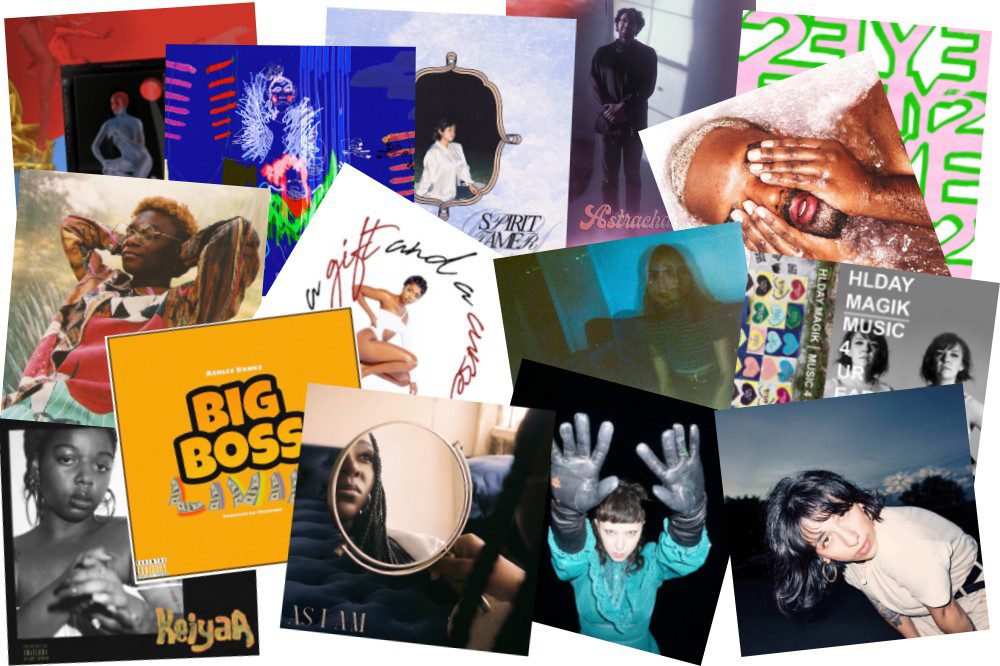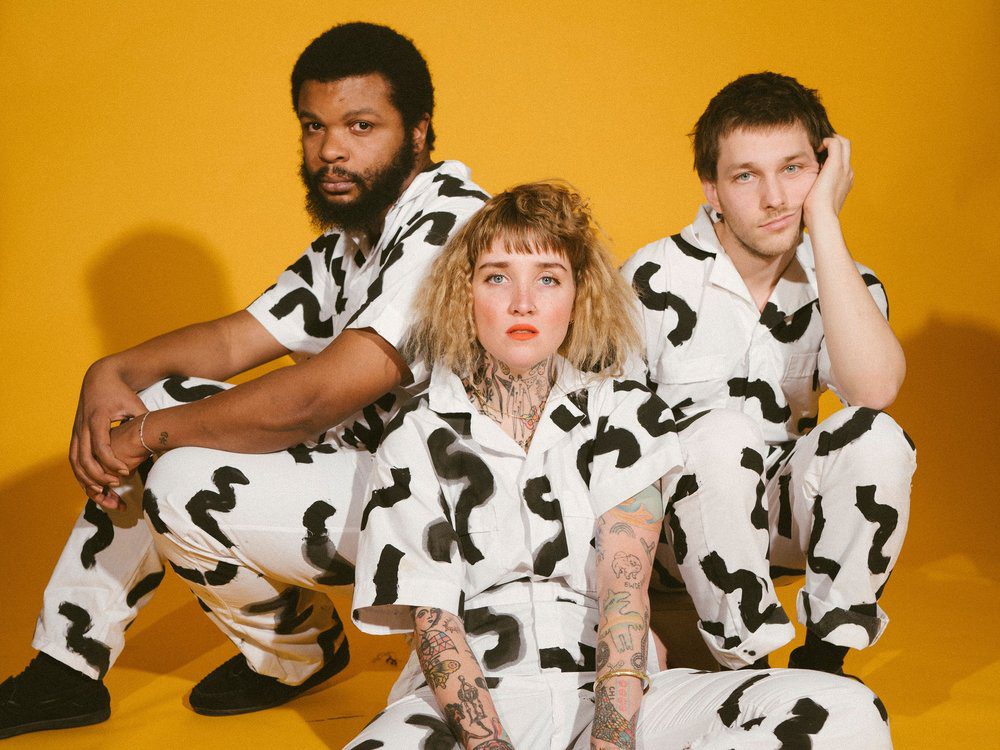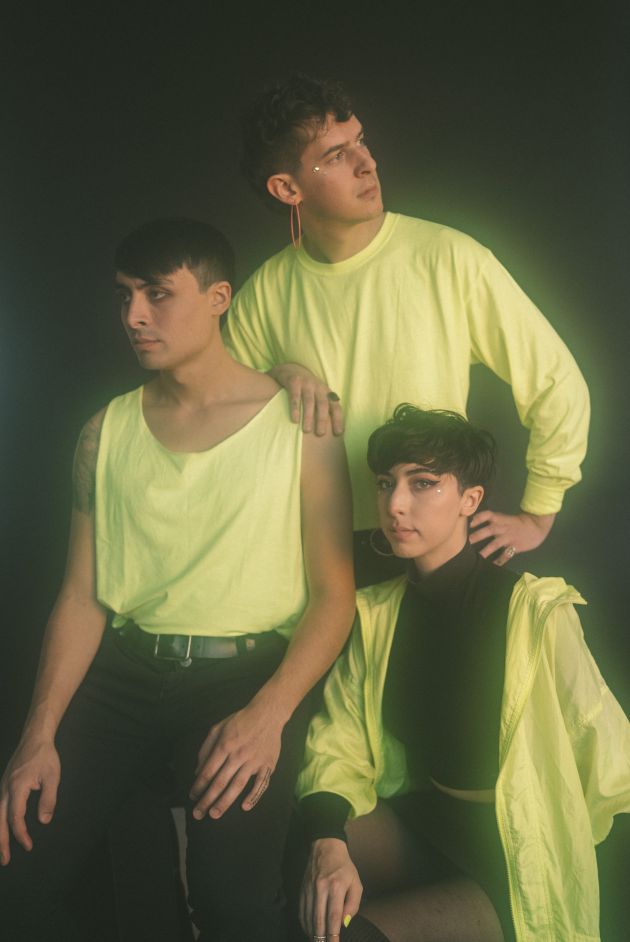PLAYING CHICAGO: 15 Songs to Usher in Spring


Spring is just around the corner – but this is Chicago. Anything can happen. It has snowed in April here (cue Prince). Luckily, neither the lingering chill in the air nor the ongoing pandemic can stop the city’s creative pulse. There are dozens of releases from exciting, rising musicians set to bloom later with the season – until then, these songs (some of which you might’ve missed in the last year) have been keeping us warm and dancing while the rest of winter melts away.
Demetruest – “Blouse Undone”
In under two minutes, singer/rapper Demetruest (a.k.a Demetruis Spidle) delivers a tightly-woven rap allegory over a fierce loop of abstract beats on “Blouse Undone.” Tracking the end of day, when hardworking folks can undo a button or two and find some after-hours relief amid life’s challenges, their lyrical repetition echoes the monotony of the every day while leaving space to celebrate surviving it. Each of the songs on their EP Direction tells a story of identity, but this one’s catchiness sticks with you.
Rat Tally – “Shrug”
With this cold and fuzzy break-up tune, Rat Tally – the musical moniker of Addy Harris – reconciles the need for closure, with the help of her guitar (solo as well as swallowed by muffled layers of distortion). Her take on grunged-up pop bubbles beneath journal-like lyrics, underscored by just a hint of precociousness and wink-delivering stand out one liners like “I wanna throw a fit, fuck, then forget it.” Harris’ vocal quiver will no doubt draw comparisons to the likes of Phoebe Bridgers and others in her indie rock company, but nowhere in my book is that a bad thing.
Pixel Grip – “Pursuit”
The goth disco is open. A dark, seductive middle-finger to making “good” choices, synthesizers grind against the hypnotic thump grounding Pixel Grip’s exciting single, “Pursuit.” Described as being about “surrendering your desires to be someone who is bad for you,” singer Rita Lukea captures an almost-desperate longing vocally, as a sinister bassline heightens the track’s overall sense of urgency.
Serena Isioma – “Meadows in Japan”
“Meadows in Japan” encourages you to get lost in a fantasy before crash-landing back to reality, while warm melodies invite you into singer/rapper Serena Isioma’s sun-kissed idea of romance. A tempo change disrupts its easy simplicity and takes you to the other side – an “I love you, but I love me more” reflection that isn’t out of character on an EP titled The Leo Sun Sets. As the beat progresses, it unravels much like Isioma’s lyrical affections, culminating in a voicemail – which would be infuriating if it didn’t sound so good.
KeiyaA – “Negus Poem 1&2” Forever, Ya Girl
On her debut album Forever, Ya Girl, KeiyaA weaves observation and meditation into R&B poetry across 16 tracks – but nowhere is the synthesis more complete than on “Negus Poem 1&2.” The track captures the feel of live jazz improvisation, bucking conventional form with the exception of its chorus-turned-chant and fading into a spoken word excerpt, a sonic template repeated in interludes across the album. KeiyaA makes it clear why she’s making music and who she’s making it for: just listen.
Tenci – “Joy”
Tenci’s soft, warbly twang tells the story of “Joy” – the title could refer to a person or personified emotion, but either way, it’s devastatingly fleeting. A song that feels both hopeful and grief-stricken, the soft strumming of the guitar becomes hypnotic as singer-songwriter Jess Shoman outlines a lullaby of sorts. Set amongst other stellar tracks on My Heart is an Open Field, a bit weathered by time and heartache, “Joy” feels like the beginning of something a bit bigger.
Sol Patches – “Couleur” (feat. Dani Ochoa-Bravo)
Three years after 2018’s Blue Transitions, Sol Patches dropped Vivid Image in February. While the release itself was a surprise, its quality is not. A journey in itself, “Couleur” confronts realities of the Black, Trans experience in America. As Ochoa-Bravo leads you to Sol Patches’ no-holds-barred verse, expressing as much anger as resolution, Sol reminds you why they’ve been so missed.
Mia Joy – “Haha”
One of the most anticipated releases of the year, “Haha” was released in January as the first single from Mia Joy’s debut LP Spirit Tamer, due May 2021. Singer Mia Rocha’s amplified whisper floats above a gentle cascade of synths and strings; enveloping the listener in a beautiful – if not a bit melancholy – ambience. Ushering in change, be it physical, mental, spiritual or otherwise, can be chaotic at times. Let Mia Joy guide you with a more meditative hand.
HLDAY MAGIK – “LUV IS MDTATN (love is meditation)”
A collection of understated, lo-fi pop tracks, singer Pamela Maurer – known as Baby Money – introduced new project Hlday Magik in February with the Music 4 Ur Ears EP. Across seven songs, Maurer explores various vocal textures and the boundaries of her bedroom production aesthetic, but the must-hear is “LUV IS MDTATN.” Without overwhelming her hushed coo, minimal instrumentation serves as the glue holding the vulnerable confessional together. It’s simply lovely.
Jackie Hayes – “Eye 2 Eye”
A bass-driven rocker, Jackie Hayes found inspiration in new wave on latest single “Eye 2 Eye.” A little grimy – with the potential for a big, noisy payoff in a future live setting – the song details the frustration that comes with self-growth, reinvention, and expectation (or lack thereof). Luckily, Hayes left some space to take out said frustrations on the dance floor.
Carlile – “Restart”
A house music-inspired cardio circuit of a song, Carlile sends her brand of pop into overdrive. A maximalist club track, “Restart” showcases the artist’s developing style and increasingly biting turn of phrase. Racing against time and dwindling patience, Carlile demands a breakthrough. Let it go.
Brittney Carter – “Prove ‘Em Wrong” As I Am
One of the best LPs of 2020, Brittney Carter’s relentlessly focused As I Am is a force. On “Prove ‘Em Wrong,” she makes sure you’ve been listening. Delivering every syllable smoothly, Carter raps with enviable self-assurance regardless of the story she’s telling. Rhythms unrushed (even sparse on other tracks), she makes sure to give every word the attention it deserves – respecting her music as a natural extension of herself.
Tink – “CAP”
Tink has had enough and she’s got a list of grievances for the fuckboys on “CAP,” appearing on 2020 EP A Gift and a Curse. She’s concise within the three-minute track, her flow poised despite “cleaning up the mess” she sings of. With a catalog of songs calling for women to stand in their worth, respect and desire, “CAP” and its earwormy hook (“too many lies, too many hoes, too many bitches”) is another one for the Tink canon.
Ashlee Bankz – “Big Boss Livin’”
Ashlee Bankz released a handful of tracks in 2020, but none were quite like “Big Boss Livin’.” In a year that needed any excuse for celebration, Bankz – undeniably dexterous vocally – directed that energy toward herself with this rapid-fire ode to moving up. There’s no filler here, no room for apology or humility. It feels good to flex; let Bankz take this minute and a half to remind you.
Astrachan – “Ladakh”
A delightful familiarity rings from Astrachan’s “Ladakh.” Its folksy, Laurel Canyon-feel dances with bits of psychedelia to lull the listener into songwriter Ben Astrachan’s memory. Building a pretty dreamy atmosphere, heightened by clever flairs of clarinet and flute, the artist’s namesake band is as charming as it is promising; be on the look out for a self-titled release due May 2021.



